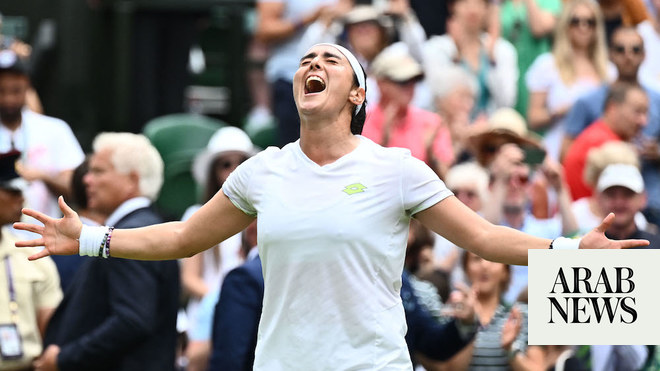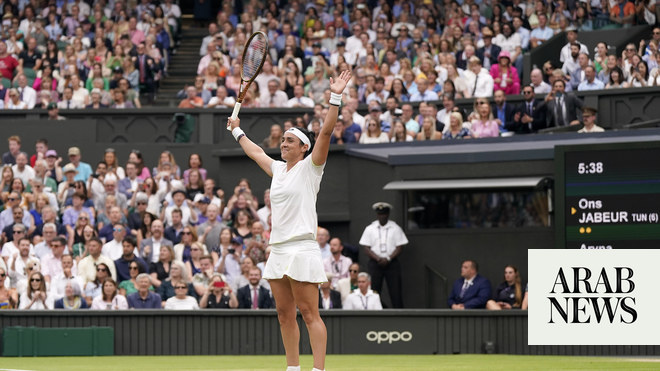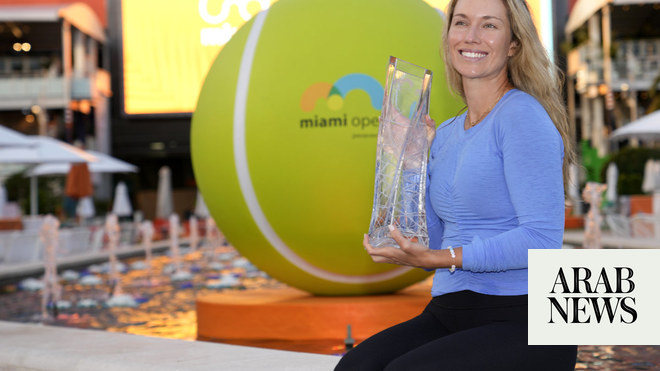
A few months into the 2020 season, one of the most startling revelations was the rise of Elena Rybakina. After stealthily breezing up the rankings in the season before, she soon became impossible to ignore. Tournament after tournament, her wins piled up and as she demolished serves and bulldozed ground strokes off both wings, She seemed destined to continue.
Instead, the pandemic struck and upon the resumption of the tour Rybakina struggled to find her way. Her fleeting moments of excellence were accompanied with frustration as she patiently awaited a breakthrough. At last, it has come. At the end of a wonderful two weeks when her form and confidence gradually blossomed, Rybakina has finally arrived at the very top of the sport.
After navigating all of the nerves and tension that accompanied her maiden grand slam final and an extremely solid start from her opponent, Rybakina fought her way back from a one set deficit to overpower Ons Jabeur, the third seed, 3-6, 6-2, 6-2 and become Wimbledon champion.
The 23-year-old is the first Kazakh player to win a grand-slam singles tournament. Having been born in Russia, she switched her nationality to Kazakhstan in 2018 after being offered financial support by the national federation. The Duchess of Cambridge was present to hand over the trophy.
After the All England Club opted to ban Russian and Belarusian players from competing in the tournament because of Russia’s invasion of Ukraine, it is ironic the tournament ended with the best Russia-born talent of the new generation breaking through. Her success, though, reflects negatively on Russia’s tennis system, which has lost a number of talents to Kazakhstan owing to its lack of funding while most of its best players train abroad.
As cries of “yalla” and “allez” rang out for Jabeur, the first Arab player and African woman to reach a grand slam singles final in the Open era, Jabeur was determined to disrupt Rybakina with her complex, varied game. She lengthened the rallies, she forced Rybakina to crouch to meet her slices and she peppered Rybakina with drop shots.
Jabeur broke serve for 2-1 and then she marched through her service games to take the set.
The momentum abruptly shifted at the beginning of the second set. Jabeur started by giving away a cheap service game with a series of unforced errors, netting a forehand on break point.
Rybakina swiftly began to play on her terms, bullying Jabeur from on top of the baseline, and the Tunisian became far too tight herself. Jabeur struggled to hit through the ball and impose herself on the match, and the few times she did try to unleash her forehand she produced numerous errors. In the end, Jabeur relied too heavily on her finesse and was too predictable.
After Rybakina took the second set, the crowd continually tried to animate Jabeur and as she trailed 2-3, she responded, generating three break points at 0-40 with a wondrous lob. With her back to the wall, Rybakina landed four first serves in five points at speeds of 117mph and above and she struck the ball with complete freedom. She saved each break point, she held serve and she never looked back as she marched on to her first grand slam title.
In her short time on the tour, Rybakina’s composure, even after her biggest victories, has become her trademark. As she achieved the childhood dreams she has worked towards her entire life, Rybakina was as understated as ever, a smile barely flickering across her face after match point. “When I was giving speech in the end I was thinking: ‘I’m going to cry right now,’ but somehow I hold it. Maybe later when I’m going to be alone in the room, I’m going to cry nonstop. I don’t know,” said Rybakina.
With no ranking points on offer this year, Rybakina will fall to 23rd place even though under normal circumstances she would have risen to a new ranking of around sixth, but this is a priceless victory and she has stepped up to another level. She has the weapons and the temperament to win more grand-slam titles and compete across all surfaces.
“Maybe I proved that not always you have to have great team from the young age because I didn’t till the age of 17, 18. So I think this is the most important thing, that everybody, no matter their financial situation, no matter who they are, they can play and achieve many great results,” she said.
Even in a career that seems to unlock new firsts for her region and continent each week, this was a special week for Jabeur despite it ending with grave disappointment. Everything she has achieved has been the result of a gradual evolution. Now ranked No 2 and a grand slam finalist at 27 years old, Jabeur has taken another step forward and she has put herself in position to tread this path again.
Afterwards, Jabeur said that her determination to win this title was so strong that she changed the lock screen on her phone to a picture of the Venus Rosewater Dish, which she showed to her audience in the press conference.
“I did everything since the beginning of the year to really focus on this tournament. I even have the trophy picture on my phone. But it wasn’t meant to be. I cannot force things. I’m not ready for it, probably, to be a grand-slam champion. I wait to look forward for the next one,” she said.












